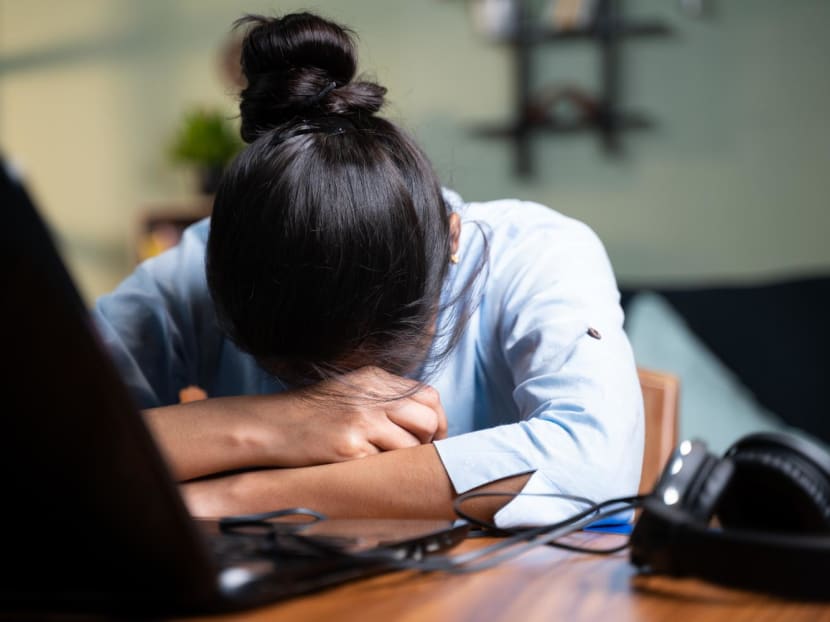More S'porean workers dissatisfied with job, suffer poorer mental health than Filipino, Indonesian peers: Survey
SINGAPORE — More employees in Singapore are dissatisfied with their job, and more suffer poor mental health, than their counterparts in Indonesia and the Philippines, a survey has found.

- A survey of employees across Singapore, Indonesia and the Philippines found workers here to be the least satisfied with their job
- This is despite spending less time at work than their regional counterparts, or at worst the same time
- Half of the Singaporeans surveyed reported having poor quality of life as opposed to less than four in 10 of the Indonesian and Filipino respondents
- Young Singaporean workers were found to be most frequently motivated by a fear of not being able to do as well as their peers, compared to their regional counterparts
SINGAPORE — More employees in Singapore are dissatisfied with their job, and more suffer poor mental health, than their counterparts in Indonesia and the Philippines, a survey has found.
The grim profile of the Singapore workforce came even though workers here report spending either less time at work than their regional counterparts or, at worst, the same amount of time on the job.
The Hustle Culture survey was conducted in July this year by consumer research and analytics firm Milieu Insight together with mental health company Intellect.
It involved 1,000 employees each from Singapore, Indonesia and the Philippines who work at least 35 hours a week. They were asked if they believed in the "hustle culture", defined by the researchers as working as much as possible or working as hard as possible to advance one's career.
The results, released on Tuesday (Sept 13), also indicated that employees here are the least engaged at work among employees of the three nations, and experience the poorest quality of life.
Workers here are also the least likely to report their mental health to be “good” or better as compared to workers in the other two countries.
Here are the survey's key findings:
WORK SATISFACTION AND ENGAGEMENT
- About one in four Singaporeans said that they were dissatisfied with their jobs, markedly higher than the 15 per cent of Indonesians and 17 per cent of Filipinos who felt the same
- Only 42 per cent of workers surveyed in Singapore reported high engagement at work, compared to 52 per cent of Indonesian employees and 56 per cent of Filipino workers
This indicated that less time spent at work does not necessarily equate to increased job satisfaction, the survey report stated.
QUALITY OF LIFE, MENTAL HEALTH
- Half of the Singaporeans surveyed reported having poor quality of life as opposed to 37 per cent of the Indonesians and 36 per cent of the Filipinos
- Correspondingly, more Singaporean (30 per cent) workers reported having poor quality sleep compared to fewer than 20 per cent of the Indonesian and Filipino workers surveyed
- Fewer than six in 10 (57 per cent) Singaporeans rated their mental health to be “good” or better. For Indonesians, it is about seven in 10 (68 per cent) and for Filipinos, about eight in 10 (78 per cent)
BURN-OUT
- Half of the employees across the region reported feeling burnt out due to work at least a few times a month
- 41 per cent of the workers reported “often” or “always” feeling that they cannot stop thinking about work
TODAY has asked Intellect and Milieu Insight for the breakdown of the results across countries.
Although Covid-19-pandemic-related and geopolitical uncertainties have contributed to this burn-out, “the glamorisation of productivity" and the “rise and grind” mentality has taken its toll on the region’s workforce, especially younger employees, the authors of the report said.
The top reasons given by workers across the region for pushing themselves hard at work were:
- Desire to build a better life for themselves and their loved ones (58 per cent)
- Achieving a sense of accomplishment (53 per cent)
- Earning more income (50 per cent)
- Workers aged 16 to 24 also tended to be motivated by the “fear of not being able to do as well as my peers”, especially Singaporeans (30 per cent of workers, compared to 20 per cent and below in Indonesia and the Philippines)
TODAY has asked the firms who did the survey what were the other top motivations, and the breakdown according to countries and age groups.
Dr Oliver Suendermann, clinical director at Intellect, said that workers tying self-worth and identity to professional achievements may tend to glorify workaholism.
Employers should normalise conversations about mental health and take preventive and reactive measures to care for their employees, he added.
In a similar survey done in 2020 among more than 2,000 Singaporeans, Milieu Insight found that 52 per cent of workers aged 16 to 24 “embraced the idea of hustle culture”.
Its chief operating officer Stephen Tracy said: "Two years on (from the last survey), I think this poll sheds light on how opinions toward work have evolved, and how the effects of the (Covid-19) pandemic and other global issues, such as inflation and a looming recession, may be weighing on the younger generations.
"The data highlights just how important it is for employees to be mindful of their work-life balance, and for employers to cultivate positive and balanced working environments."











